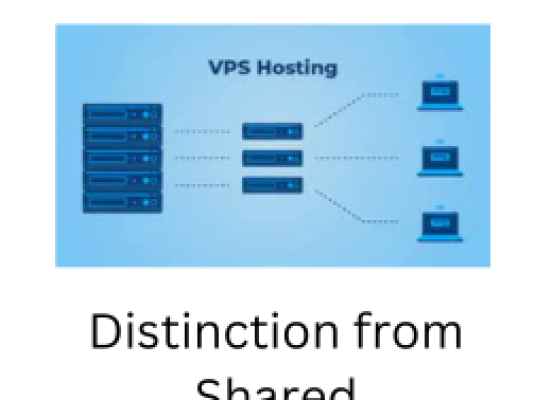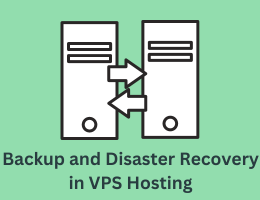
What is VPS Hosting: An overview of VPS hosting, explaining the concept of virtualization and how it differs from shared hosting and dedicated hosting.
- By admin --
- Wednesday, 02 Aug, 2023
Introduction
In the ever-evolving landscape of web hosting, Virtual Private Server (VPS) hosting has emerged as a popular choice for individuals and businesses seeking more control and performance than what shared hosting offers, without the expense of dedicated servers. VPS hosting leverages the power of virtualization to create isolated virtual environments, providing users with a unique set of resources and capabilities. In this comprehensive guide, we will delve into the concept of VPS hosting, explore virtualization technologies, and compare it with shared and dedicated hosting to better understand its advantages and use cases.
- What is VPS Hosting?
VPS hosting is a hosting solution that falls between shared hosting and dedicated hosting in terms of resource allocation and control. It involves partitioning a physical server into multiple virtual machines (VMs), each functioning as an independent and private server. These virtual machines operate on a single physical server but act as individual entities with dedicated resources such as CPU, RAM, storage, and network connectivity.
2.The Concept of Virtualization
Virtualization is the foundation of VPS hosting. It is a technology that allows multiple virtual machines to run on a single physical server, making efficient use of hardware resources. A hypervisor, also known as a Virtual Machine Monitor (VMM), is responsible for creating and managing these virtual machines. The hypervisor ensures that each virtual machine remains isolated and operates independently, despite sharing the same underlying hardware.
There are two primary types of virtualization commonly used in VPS hosting:
a) Full Virtualization: In this approach, the hypervisor emulates a complete set of hardware components, enabling multiple operating systems (OS) to run simultaneously on the same server. Each virtual machine has its own guest OS, and the hypervisor handles all communication with the underlying hardware.
b) Para-virtualization: This type of virtualization requires slight modifications to the guest OS, enabling direct communication with the hypervisor and improving performance compared to full virtualization.
3.How VPS Differs from Shared Hosting
Shared hosting involves hosting multiple websites on a single server, sharing resources such as CPU, RAM, and bandwidth. This approach is cost-effective, but it can lead to performance issues and potential security risks. In shared hosting, one website's heavy traffic or resource consumption can adversely affect other websites on the same server.
In contrast, VPS hosting addresses these limitations by providing a more isolated environment. Each VPS functions as a standalone server with its own allocated resources, preventing one VPS from impacting others. This isolation enhances security, performance, and overall stability.
4.How VPS Differs from Dedicated Hosting
Dedicated hosting provides an entire physical server dedicated to a single user or organization. While this offers the highest level of control and customization, it comes with a higher cost. VPS hosting, on the other hand, offers a balance between shared and dedicated hosting.
In VPS hosting, multiple users share the same physical server, but each user's VPS operates independently with its own set of resources. This makes VPS more affordable than dedicated hosting while still providing a degree of control and customization comparable to dedicated servers.
5.Advantages of VPS Hosting
a) Enhanced Performance: With dedicated resources, VPS hosting ensures consistent and reliable performance, regardless of other users' activities on the same server.
b) Root Access and Control: VPS users typically have root access, granting them full control over the server's configuration and software installations.
c) Isolation and Security: VPS hosting offers a higher level of security compared to shared hosting, as each VPS is isolated from others on the server, reducing the risk of security breaches.
d) Scalability: VPS hosting allows for easy scalability, enabling users to upgrade or downgrade their resources as their website or application demands change.
e) Cost-Effective: VPS hosting strikes a balance between performance and cost, making it an attractive option for users who require more resources than shared hosting can provide but don't need a full dedicated server.
f) Customizability: VPS hosting allows users to install and configure software according to their specific needs, making it ideal for projects with unique requirements.
6.Use Cases for VPS Hosting
VPS hosting serves a wide range of use cases due to its flexibility and performance advantages:
a) Website Hosting: Individuals and small businesses can use VPS hosting to host their websites and blogs, benefiting from improved loading times and better security.
b) Application Hosting: Developers and organizations can deploy their web applications and APIs on VPS hosting for dedicated resources and reliable performance.
c) Development and Testing: VPS environments are also suitable for development and testing purposes, providing a controlled and isolated space for software development.
d) E-commerce: VPS hosting is a popular choice for e-commerce websites, as it offers the necessary resources and security to handle online transactions and traffic spikes.
e) Web and Game Servers: VPS hosting can serve as a web server or a game server, delivering reliable and high-performance experiences to users.
Conclusion
Virtual Private Server (VPS) hosting is a powerful and versatile hosting solution that bridges the gap between shared and dedicated hosting. Through the concept of virtualization, VPS hosting enables the creation of isolated virtual machines, each operating as an independent server with dedicated resources. Its advantages, including enhanced performance, control, and security, make it a compelling option for various use cases, from personal websites to enterprise-level applications. By understanding the distinctions between VPS hosting and other hosting types, individuals and businesses can make informed decisions about their hosting needs and benefit from the flexibility and scalability VPS hosting provides.





